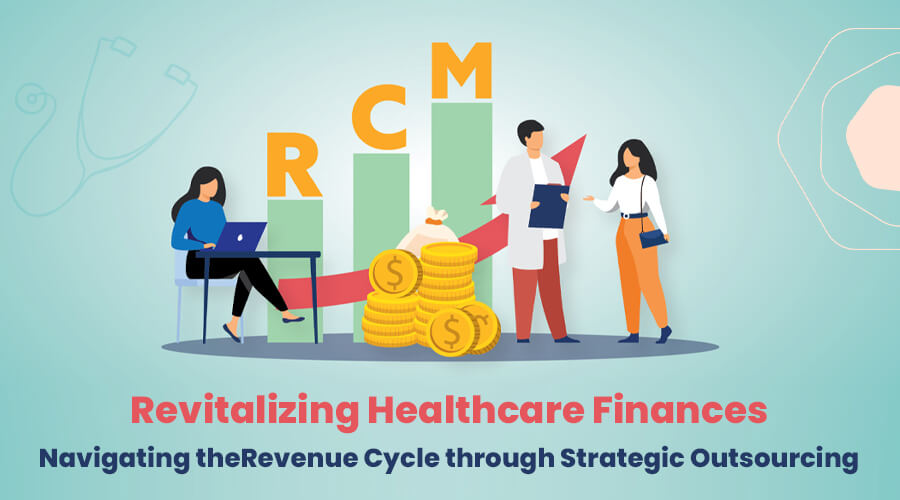The revenue cycle functions as the complex procedure of generating invoices and securing payments for healthcare services. It stands as a multifaceted and time-intensive procedure, often posing challenges for healthcare organizations to manage efficiently in-house. This is where the significance of outsourcing the revenue cycle, often referred to as revenue cycle outsourcing (RCO), becomes apparent.
RCO involves the practice of enlisting a third-party entity to oversee some or all aspects of the revenue cycle, enabling healthcare organizations to redirect their focus towards other vital priorities, such as enhancing patient care.
Revenue Cycle Outsourcing (RCO) has many benefits:
1. Improved Operational Efficiency: RCO organizations with specific skills manage the revenue cycle better than in-house initiatives.
2. Cost-Efficiency: RCOs may offer cheaper services than healthcare facilities.
3. Accelerated Cash Flow: RCO firms accelerate payment collections, boosting healthcare entities’ cash flow.
4. Streamlined Compliance: RCOs help companies comply with complicated healthcare standards, reducing legal risks.
However, RCO adoption has hazards, such as:
1. Possible Control Loss: Leaving the revenue cycle to an outsider involves giving up some control. If the RCO disappoints, revenue management may be lost.
2. Data Security Issues: As healthcare companies outsource their revenue cycle, data protection is crucial. To reduce outsourcing risks, protect sensitive data against breaches or illegal access.
3. Communication Challenges: Communication lapses between healthcare organizations and RCO entities can lead to errors and delays in the revenue cycle process.
When considering the advantages and downsides, Revenue Cycle Outsourcing (RCO) is a viable alternative for healthcare institutions looking to improve revenue cycle management. Delegating revenue cycle tasks allows firms to streamline procedures, decrease operational hassles, and perhaps optimize financial results. The decision-making process should include a thorough evaluation of these risks and benefits.
In-House V/S Outsourced Revenue Cycle Management:
Healthcare organizations must choose between in-house and outsourced revenue cycle management.
Manage Revenue Cycle in-house:
Choosing in-house revenue cycle management means the healthcare organization manages all revenue cycle aspects inside. This involves billing, coding, and collections. This technique gives the company more control over its finances. The internal team can closely monitor and adapt tactics based on real-time data for targeted and responsive revenue management.
Autonomy costs. Managing the revenue cycle in-house requires time, resources, and experience. Healthcare firms must recruit and retain qualified workers, keep up with changing regulations, and invest in modern technologies to optimize the process. Revenue cycle management can complicate operations and distract from fundamental healthcare functions.
Revenue Cycle Management Outsourced:
Conversely, outsourced revenue cycle management entails working with outside experts or service providers to manage revenue cycle components. This strategy lets healthcare companies use revenue management experts. Outsourcing can improve operational efficiency, reduce costs, and provide access to cutting-edge technology without infrastructure construction.
Choosing the Right Approach:
The decision between in-house and outsourced management depends on factors such as the organization’s size, complexity, budget, expertise in revenue cycle management, and the willingness to cede control.
If uncertain, seeking advice from a specialist in revenue cycle management is advisable. They can help in assessing needs and formulating a strategy tailored to the organization.
Choosing a Company for Revenue Cycle Outsourcing: A Guide
Opting for outsourcing requires careful selection of a reputable company. Consider the following tips:
1. Explore Referrals: Gather suggestions from fellow healthcare organizations.
2. Perform Investigation: Evaluate various companies and their services.
3. Confirm Industry Proficiency: Validate the firm’s competence within the particular healthcare sector.
4. Document Everything: Ensure all aspects, including contract terms and conditions, are documented in writing.
By adhering to these guidelines, organizations can choose an RCO partner that enhances the efficiency and effectiveness of their revenue cycle, facilitating long-term financial success amidst the challenges of constrained hospital finances.

